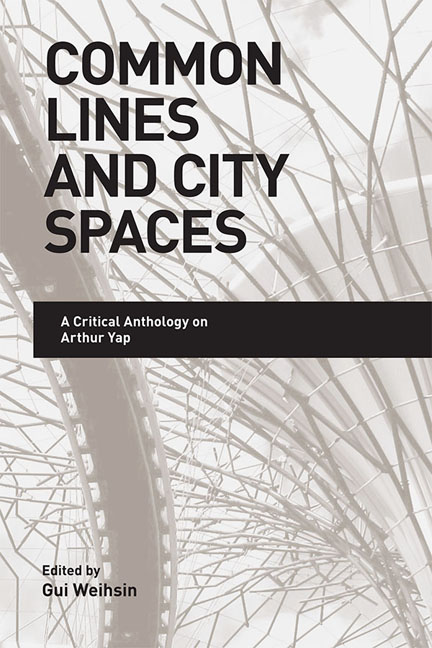Book contents
- Frontmatter
- Contents
- Acknowledgements
- About the Contributors
- 1 Common Lines and City Spaces: Introduction
- 2 The Transformation of Objects into Things in Arthur Yap's Poetry
- 3 “the same tableau, intrinsically still”: Arthur Yap, Poet-Painter
- 4 “go to bedok, you bodoh”: Arthur Yap's Mapping of Singaporean Space
- 5 On Places and Spaces: The Possibilities of Teaching Arthur Yap
- 6 Arthur Yap's Ecological Poetics of the Daily
- 7 “except for a word”: Arthur Yap's Unspoken Homoeroticism
- 8 “a long way from what?”: Folkways and Social Commentary in Arthur Yap's Short Stories
- Index
- Plate section
4 - “go to bedok, you bodoh”: Arthur Yap's Mapping of Singaporean Space
Published online by Cambridge University Press: 19 May 2017
- Frontmatter
- Contents
- Acknowledgements
- About the Contributors
- 1 Common Lines and City Spaces: Introduction
- 2 The Transformation of Objects into Things in Arthur Yap's Poetry
- 3 “the same tableau, intrinsically still”: Arthur Yap, Poet-Painter
- 4 “go to bedok, you bodoh”: Arthur Yap's Mapping of Singaporean Space
- 5 On Places and Spaces: The Possibilities of Teaching Arthur Yap
- 6 Arthur Yap's Ecological Poetics of the Daily
- 7 “except for a word”: Arthur Yap's Unspoken Homoeroticism
- 8 “a long way from what?”: Folkways and Social Commentary in Arthur Yap's Short Stories
- Index
- Plate section
Summary
Especially during his later years, Arthur Yap was generally regarded as a private and reclusive figure who kept out of both the public eye and Singapore's literary scene. Indeed, criticism about Arthur Yap's poetry often contends that his poems are more concerned with a general human subjectivity existing in an anonymous, modern urban space rather than with specific particulars of Singaporean society or history. In contrast to this prevailing view of Yap's writing, this chapter focuses on his direct engagement with and literary explorations of Singaporean local spaces that show us an active and democratizing engagement with everyday life in Singapore. I argue that Yap frequently utilizes encounters with such spaces to map moments in Singapore's social and cultural history, and to explore a complex relationship with personal and national memory in ways markedly different from other local poets of his generation. Yap's allusions to local space are therefore of special significance, given that in much of his verse he pares poetry down to its bare essentials, favours understatement, and only makes rare but precise references to identifiable places in Singapore.
Much of my exploration of Yap's engagement with local space and time will be interdisciplinary. While drawing upon both art history and local topography, my investigation is also informed by a critical tradition hitherto rarely referred to in discussions of Yap's work: historicism. For reasons of perceived political and pedagogical expedience, Singaporean literary criticism has until recently remained highly influenced by the traditionally hermeneutic, textually focused critical schools of New Criticism and Formalism. As a consequence the idea of the poem as an autotelic or selfenclosed artwork prevails in Singapore. In his own country therefore Yap is predominantly characterized as an almost self-effacing poet who is constantly making large, generic, and universal points that transcend the specificities of local culture and society. Yet, at the same time, Yap's work is often characterized by its ambiguity and ambivalence. These qualities might suggest that we too, as reader-viewers of Yap's work, need to exercise caution and probe the ambivalence surrounding the poet's self-effacement of his biography and background. In a significant number of poems Yap offers tantalizing glimpses of concrete and specific geographical, historical, and cultural particulars that invite readers to reflect on the implications of these details.
- Type
- Chapter
- Information
- Common Lines and City SpacesA Critical Anthology on Arthur Yap, pp. 73 - 95Publisher: ISEAS–Yusof Ishak InstitutePrint publication year: 2014



